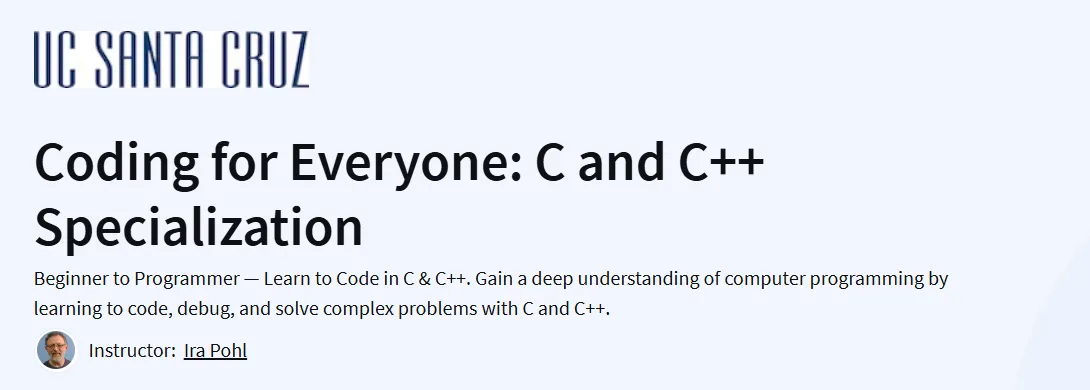What you will learn in Coding for Everyone: C and C++ Specialization
Write and debug code in C and C++ programming languages.
Understand algorithms and how to properly express them.
Develop problem-solving skills applicable to real-world scenarios.
Apply programming knowledge to complex problems using AI algorithms and Monte Carlo evaluation in games.
Program Overview
C for Everyone: Programming Fundamentals
⏳ 15 hours
- An introduction to the C programming language, covering basic programming concepts, data types, and control structures.
C for Everyone: Structured Programming
⏳ 15 hours
- Focuses on structured programming techniques in C, including functions, arrays, pointers, and memory management.
C++ For C Programmers, Part A
⏳ 13 hours
- Introduces C++ programming to those familiar with C, covering object-oriented programming concepts and the Standard Template Library (STL).
C++ For C Programmers, Part B
⏳ 15 hours
- Continues the exploration of C++ programming, delving into advanced topics and applications in AI and complex games
Get certificate
Job Outlook
Completing this specialization prepares you for roles such as Software Developer, Systems Programmer, or Embedded Systems Engineer.
The skills acquired are applicable across various industries that utilize C and C++ programming.
Enhance your employability by gaining practical experience in foundational programming languages.
Specification: Coding for Everyone: C and C++ Specialization
|
FAQs
- No prior coding experience is required.
- The course starts with basics like variables, loops, and data types.
- Having logical thinking or math background helps but isn’t mandatory.
- Yes, since C++ is widely used in major game engines.
- The course introduces AI algorithms and Monte Carlo methods, which are game-relevant.
- For advanced 3D graphics, you’ll need extra learning beyond this specialization.
- It strengthens algorithmic thinking, memory management, and problem-solving skills.
- These are common topics in coding interviews.
- You may still need additional practice on data structures and competitive coding.
- Prepares you for entry-level roles like software developer or systems programmer.
- Useful for embedded systems, performance-critical apps, and OS-level programming.
- It’s also a foundation for pursuing advanced fields like robotics or cybersecurity.
- C and C++ offer deeper understanding of memory, efficiency, and system-level coding.
- Python/Java are easier for beginners but hide low-level details.
- Starting with C/C++ makes learning other languages smoother later.





